
Funded Experiments
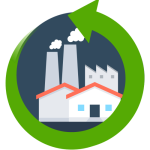
The first round of experiments funded under the KYKLOS4.0 project are under way. Seven projects, funded under the KYKLOS4.0 – Open Call #1, started last 1 November 2021 developing a broad range of digital manufacturing activities and will run for six months until 30 April 2022.
The funded experiments involve SMEs and manufacturing companies from several European countries, including Italy, Spain, Portugal, Serbia, Greece, and Switzerland. Also, these projects will focus on key KYKLOS4.0 domains, including circular manufacturing deep learning, big data and data management, life cycle analysis, and cyber-physical systems.
Find out more about the funded experiments below.
ADME
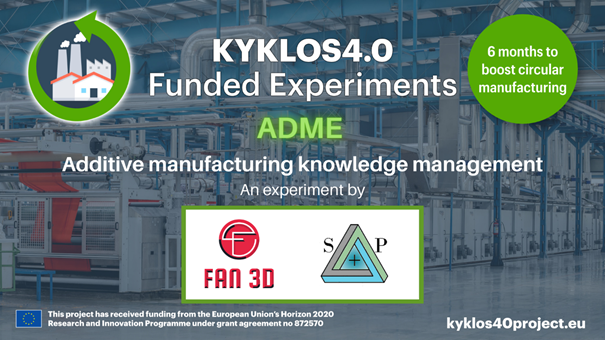
| Title |
|---|
| Additive manufacturing knowledge management |
| Acronym |
| ADME |
| Partners |
| SMASP REDES PROFESIONALES S.L. (Spain) [Coordinator]; Favoritanswer Lda. (Portugal) |
| Target sub-domains |
| Circular manufacturing, deep learning, decision support systems |
| Abstract |
| Additive Manufacturing (AM) is the process of joining materials to create objects from 3D model data, applying layer upon layer. One of the main challenges of the increasing applications of AM, is related to the wide range of materials that makes the decision-making process of choosing the right material difficult. Material selection is converted into one of the most critical and important activities for engineers during design phase and manufacturing processes. Selected material at the beginning of design stage affects the designed component functionality as well as manufacturability and final product cost. The aim of ADME project is to address the development of decision-making support tool based not only on the information provided by the material suppliers but also based on inputs and know-how gained by manufacturing with these materials. The smart developed software tool will include process parameters, “non-catalogued”. An innovative aspect will be also to allow the user to take a decision on the recyclability of the material used, which is becoming more and more relevant when choosing the material to be used. This tool will allow 3D printing companies, being able to use a wide range of AM polymer materials. They will be capable of making well informed decisions, keeping the acquired know-how “registered”. This will provide the companies by even wider range of materials in the manufacturing of customized products, increasing the competitiveness of each company. |
BEERco2
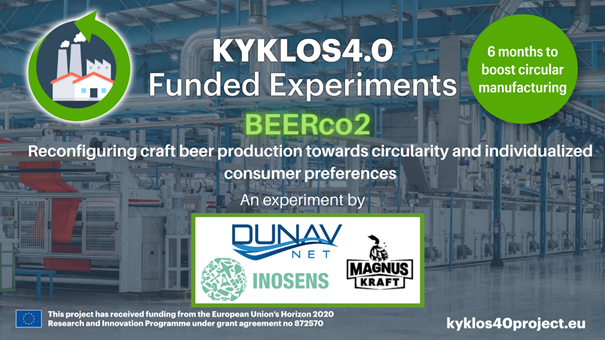
| Title |
|---|
| Reconfiguring craft beer production towards circularity and individualized consumer preferences |
| Acronym |
| BEERco2 |
| Partners |
| DNET (Serbia) [Coordinator]; Magnus Kraft (Serbia), INOSENS (Serbia) |
| Target sub-domains |
| Cyber-physical systems, Life cycle analysis, Circular manufacturing |
| Abstract |
| The craft brewing is associated with the same environmental concerns as larger breweries, such as energy and water consumption, wastewater and solid waste, and greenhouse gas emissions. However, contrary to larger breweries, there is a scarcity of tailored (technical/digital) solutions to optimize production of craft breweries in line with circular economy models as well as with specific consumer preferences. To address this challenge, BEERco2 will create and validate a blueprint for technologies and activities which will enable small craft breweries to convert their production to the circular economy model as well as towards a consumer centric, on-demand, manufacturing. The BEERco2 solution will include the following elements: 1. sensors for measuring different parameters related to production inputs (temperature, water consumption, water pH levels); 2. identity tags for encoding unique identity of the ingredients; 3. edge IoT gateways for collection, initial processing and forwarding of the sensor measurements to the cloud subsystem; 4. entry forms to capture other production data that is important for the overall process but not yet sensorized (identity of the cook, start date of the batch, etc.). This edge subsystem will be connected to the cloud business logic using KYKLOS4.0 Interface (MI). KYKLOS 4.0 Cyber-physical Infrastructure will be also leveraged to accelerate deployment of the edge features, while PLM and LCA modules will be utilized for transparent provision of evidence related to the carbon footprint generated by the beer production. As such, BEERco2 is aligned with KYKLOS4.0 goals related to Customer Centricity, On-demand manufacturing and Decrease raw materials, and it focus on 3 sub-domains of the open call - Cyber-physical systems, Life cycle analysis and Circular manufacturing. The BEERco2 solution will be deployed, validated and demonstrated over 6 months period through three phases experiment at ‘Magnus Kraft’ - a craft brewery located in Novi Sad, Serbia. Expected impacts of the BEERco2 solutions are: a) social - influencing beer consumers' behaviour towards greater sustainability; b) economic - enhancement of craft breweries’ competitiveness by allowing them to adapt to new sustainability requirements, trends and technologies; c) environmental - more effective management of raw materials and remains from the beer production process. The BEERco2 consortium is comprised of DNET (coordinator) with expertise in the domain of designing and provisioning turnkey IoT/AI solutions; Magnus Kraft - a craft brewery (pilot site provider), INOSENS, an SME with proven specialisation in business support, internationalization and access to finance, … |
D4CM
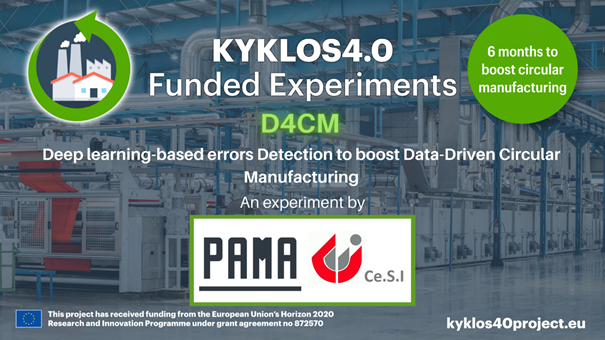
| Title |
|---|
| Deep learning-based errors Detection to boos Data-Driven Circular Manufacturing |
| Acronym |
| D4CM |
| Partners |
| Ce.S.I. Centro Studi Industriali (Italy) [Coordinator]; PAMA Spa (Italy) |
| Target sub-domains |
| Cyber-physical systems, Deep learning |
| Abstract |
| Major errors of machine tools (MT) are geometric/kinematic errors and thermal errors that occurs due to extended usage of the machine, which causes heat generation and leads to the expansion of the various structural elements of the machine tool. Machine Tools users of course implement some strategies, more or less effective, to compensate such errors. However, such strategies are generally tailored to a specific application scenario and suffer the changing of machine configuration, especially in the case of renovation or/retrofitting at end of first life (EO1L). D4CM thus aims to develop, implement and validate a robust and confident CPS platform that includes an AI-based machine Errors Detection and Adaptive compensation models relying on Deep Learning techniques. These models are developed with an holistic (from Design stage to Renovation) and modular approach that enables a quick and effective retraining and re-deployment in case of reuse of equipment, to foster circular manufacturing. This is fully in line with KYLOS4.0 approach and addresses the Deep Learning subdomain. D4CM kit solutions can be exploited as a part of a distributed CPS system, where tools, hardware and software can dynamically added or removed, and dynamically exchange information and collaborate. Deep learning and control models can both be re-used for 2nd life of machines and provide feedback to the Design stage for updating future machine developments. This modular and hierarchical approach will enable also the proper scalability of the concepts according to user needs, and can then be replicated in different industrial contexts to build and foster resilience in circular manufacturing. D4CM will provide manufacturers with solutions to respond more quickly, accurately, eco-friendly and successfully to COVID-19 disruptions. The expected socio-economic impact of the project are the following: • Enabling reduction of energy consumption (-15%) related to reduction of installed power of devices and equipment for structural cooling/conditioning. • Reduction of waste and scraps (-10÷15%) due to the increased machining quality. • Improved competitiveness of the participating companies • Development of new products and services along the AI value chain creates new business opportunities for technology provider • Reduction of re-configuration and renovation costs (up to 80%) • Leveraging on AI to capitalise on digitalization and foster smart and sustainable manufacturing The consortium include two industrial partners: Ce.S.I. Centro Studi Industriali (CeSI) and PAMA. CeSI is a SME supplier of engineering and digital services (mechanical design, simulation, AI-basedpredictive analytics, data mining). PAMA is a leader in the market of big size milling-boring machines. |
DREAM
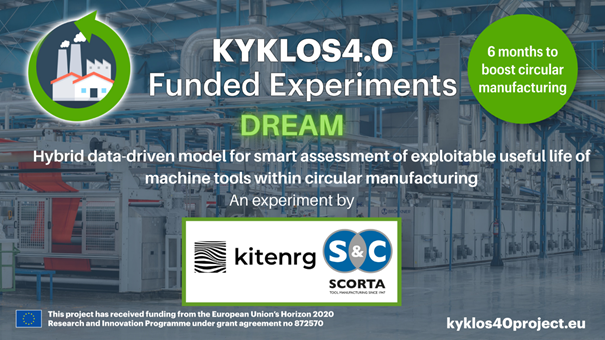
| Title |
|---|
| Hybrid data-driven model for smart assessment of exploitable useful life of machine tools within circular manufacturing |
| Acronym |
| DREAM |
| Partners |
| KITENERGY Srl (Italy) [Coordinator]; SCORTA Srl (Italy) |
| Target sub-domains |
| Circular manufacturing, decision support systems |
| Abstract |
| Containing operative costs (e.g., reducing machine tool downtime) and assuring quality are important aspects for the customers of machine tool builders to consider for an effective reuse of equipment. Quality, however, heavily depends on the condition of the equipment. At the end of the first lifetime (EO1L) of a machine tool, the assessment of its exploitable life for reuse is of paramount importance to boost sustainable and effective circular manufacturing. Therefore, the objective of this project is to develop a Hybrid data-driven (AI + physics based) Decision Support platform able to: • Assess the actual exploitable life of machine components at EO1L • Identify component that need to be replace and or remanufactured • Assess the Total Cost of Reuse of machine tools (for the second lifetime) • Enable an effective predictive maintenance for the second life This decision support platform relies on: • A data-driven (AI-based) model that: o Estimate the actual Duty Cycle of the machine tool. o Perform AI anomaly detection for diagnosis and prognosis. o Predict the value of features points/areas that cannot be sensorized. • A physics-based model that assesses the exploitable life of machine tool components, identify the ones that need to be replaced/renovated. DREAM partners provide the KYLOS4.0 with the proper expertise to extend its technologies portfolio by strengthening the application of data-driven decision support systems in the domain of circular manufacturing. |
EFIM - Food
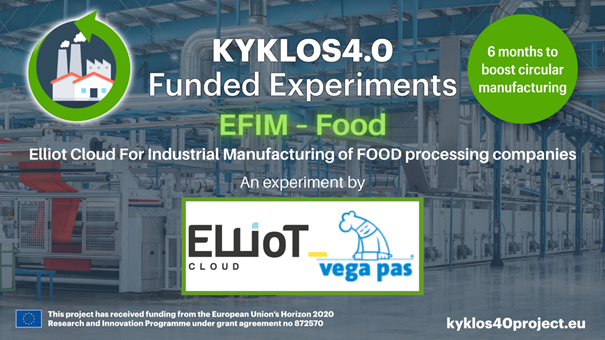
| Title |
|---|
| Elliot Cloud For Industrial Manufacturing of FOOD processing companies |
| Acronym |
| EFIM – Food |
| Partners |
| Elliot Cloud SL (Spain) ; Vega Pelayo S.L. (Spain) |
| Target sub-domains |
| Life cycle analysis, big data and data management |
| Abstract |
| Economy is currently facing climate challenges as never before. Industries need to adapt to more climate-resilient environments as well as to reduce their impacts on the planet’s health. EFIM- Food is thus proposing a solution for the food processing industries, in order to bring circularity to this type of industry. EFIM Food, is a partnership of two different SMEs from Spain: • Elliot Cloud, as technology provider owner of a software solution that provides data connectivity across machines, sensors or connected elements at different environments (industry, critical infrastructure, cities, etc). • Vega Pelayo, a food processing family business from Spain. They manufacture traditional bakery desserts from the northern region of Cantabria in Spain, selling internationally their products to well-known distribution firms like Carrefour. The main objective of the project is to bring sustainability and circularity to traditional food processing companies via the use of advanced technologies like Internet of Things, Artificial Intelligence, Life Cycle Assessment tools and support decision systems. EFIM-Food will run a pilot at the factory of Vega Pelayo, where they will monitor and integrate the data of different parts of the manufacturing of a traditional dessert called “Sobao” (sponge cakes) which counts with a PGI (Protected Geographical Indication). The integration of the manufacturing process data, within a current manual process and obtaining indicators that measure how environmentally friendly the process is, will be an innovation as such for Vega Pelayo. Additionally, the quality step forward will use some of the software modules provided by KYKLOS 4.0 consortium which will: • Automatize the collection of data from the industrial process of manufacturing a traditional food dessert. • Enhance the automatization not only with purely industrial information (like OEE, failure rate, loss of productivity...) but adding energy, water, raw materials consumption and waste with a view to reduce the carbon footprint of the process and helping in transitioning, to a waste zero approach. • Develop a DSS system enhanced by artificial intelligence, able to suggest the optimal processing parameters when manufacturing Sobaos, including parameters like temperature or humidity, which might affect the quality of the final product but also the usage time of an oven or the amount of water needed in the recipe cooking. This translates into major direct savings. The pilot run in Vega Pelayo foresees major savings in energy (190Mwh) and water consumption (350m3). This represents avoiding emissions of up to 135tons of CO2 per year which have been calculated based on actual consumptions at the factory and average estimations for IIoT projects. EFIM Food will be a strategic project for the technology provider, Elliot Cloud. The additional components provided by KYKLOS 4.0 will allow Elliot Cloud to enhance the functionalities of its platform and scale up to a new segment of the market (like food processing companies) which is not yet exploited. |
METALICA
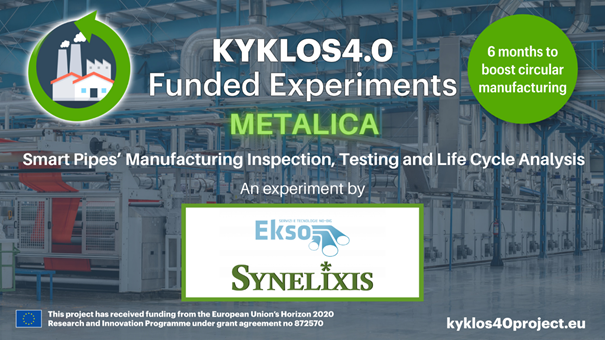
| Title |
|---|
| Smart Pipes’ Manufacturing Inspection, Testing and Life Cycle Analysis |
| Acronym |
| METALICA |
| Partners |
| Synelixis Solutions S.A. (Greece) [Coordinator]; EKSO S.r.l. (Italy) |
| Target sub-domains |
| Cyber-physical systems, life cycle analysis, augmented reality, big data and data management, deep learning |
| Abstract |
| Based on the METALICA consortium‘s experience, water losses in the underground hydraulic and irrigation networks exceed in many cases 50% of water. Beyond the significant ecological footprint, the possibility of accurately identifying the point of leakage determines a substantial reduction of these maintenance costs, improving the efficiency of the network. In this context, METALICA implements a novel, modular, configurable, and intelligent solution for lifecycle assessment and condition-based maintenance of pipes used in hydraulic networks. The solution will provide the means for gathering and analysing digital data about the conditions of the pipes towards optimizing their lifecycle management including their maintenance, services, repair, and other lifecycle management processes. To this end, the project will develop an innovative digitally-enabled lifecycle assessment tool for pipes, which will provide the means for optimizing both economic and environments parameters, while providing recommendations for resolving relevant trade-offs. METALICA introduces Digital Twin, Deep Machine Learning (ML) and Mixed Reality (XR) technology in the manufacturing of smart pipes for water distribution/irrigation and critical infrastructure to (a) Identify in near real-time (NRT) any smart pipe production discrepancy; (b) analyze and assess the produced pipes expected LCA/CBM; and (c) lead to smart pipes Zero Defect Manufacturing (ZDM). The METALICA system will be utilized during smart pipes’ production time as an intelligent testing and defect inspection toolbox. Moreover, deep ML assisted assessment will be combined with AR technology for identifying the exact location of any defect on the pipe leading to ZDM. METALICA will be extensively tested and validated in the Ekso factory in Italy. Beyond manufacturing, the METALICA system will have a significant exploitation potential in predictive maintenance and identification of leakages in underground hydraulic and irrigation networks in municipalities and urban areas, along with industrial and critical infrastructures’ smart pipe networks. METALICA is comprised of industrial partner Ekso s.r.l., which has already experienced prototype smart pipes having embedded grids of Fiber Bragg Grating (FBG) from the production stage. The METALICA coordinator Synelixis S.A. has significant expertise in CPS and deep ML. Within METALICA, Synelixis will consider smart pipes as huge/long CPS, create initially their digital twins and then will develop an intelligent NRT monitoring system making the hydraulic network of pipes integrable and interconnected, typical of the so-called Smart Industry 4.0. |
PET-Circle
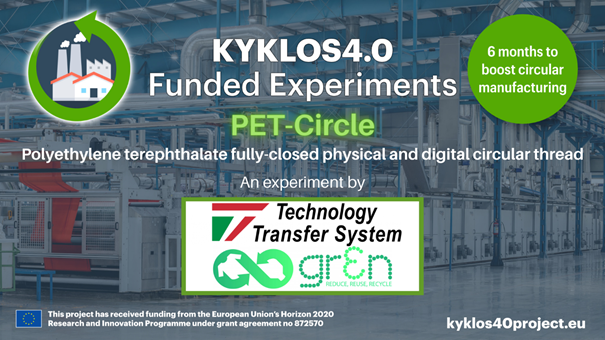
| Title |
|---|
| Polyethylene terephthalate fully-closed physical and digital circular thread |
| Acronym |
| PET-Circle |
| Partners |
| TTS Technology Transfer System Srl (Italy) [Coordinator]; GR3N SA (Switzerland) |
| Target sub-domains |
| Cyber-physical systems, product lifecycle management, circular manufacturing, big data and data management |
| Abstract |
| PET-Circle addresses circular manufacturing opportunities by proposing a pilot implementation of a PET-products circular value chain. Today, PET is already recycled, but the current process (based on purely mechanical treatment) degrades and downgrades the material performances. Thus, recycled PET is used for products that are less and less noble, whose final destination can only be incineration, landfilling and, most of the time, dispersion in the environment. The proposed pilot will focus on two major pillars: 1) implementing in practice a small-scale circular value chain, having at its centre a new technology developed in the Horizon 2020 project DEMETO, GA-768573; 2) sustaining the “physical” side of this CE implementation with an adequate digital counterpart that manages the gathering, certification and exploitability of manufacturing and traceability data along the value chain. Besides the pilot implementation, the proposal therefore faces some of the high-level challenges that are still standing for a fully digital industry and value chain, having direct impact on the implementation of circular principles: 1) the silo effect is still standing - interfaces are only partially developed and data systems are incompatible or not integrated one another; 2) lack of secure exchange of data; 3) lack of clear data ownership; 4) no effective and reliable LCA data sources for certification; 5) poor exploitation of IoT-enabled data streams. PET-Circle is comprised of TTS Technology Transfer System Srl (Italy) and GR3N SA (Switzerland) |

